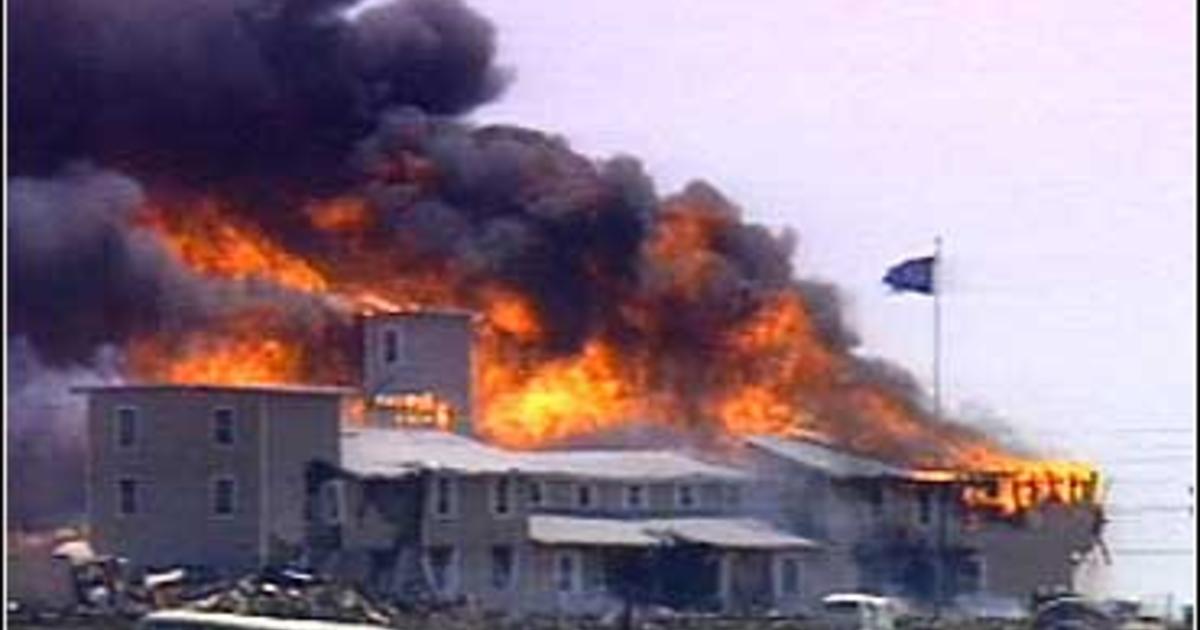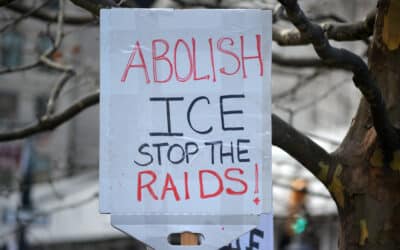“We determined, that at the compound, machine guns were being manufactured and explosive devices. Our goal through this investigation, was to execute a search warrant on that house to obtain those illegal weapons.” (Waco, ROE, 32:07)
“In addition, it (ATF) had reason to believe that Koresh and his followers might pose a danger not only to themselves, but to the surrounding community.” (Ibid., 32:24)
“In a word, what the search warrant found, was gun parts. It was the duty of the ATF to show that those gun parts were owned with an intent to create illegal weapons. I’m not a lawyer, or a judge, but my reading of the warrant does not convince me that that intent was there.” (Ibid., 32:47)
I’m not certain which narrative the average person who believes they know the facts of the Davidian Massacre holds to; illegal guns or abused children? The fact that the ATF was the department conducting the February 28th raid should be a clue. That it doesn’t cause more people to question why the ATF was in charge when the welfare of minors was a major part of the search warrant may speak to the aura of “authority” the government, and their press, have over people’s minds.
A Legal Gun Business?
Like thousands of other people in Texas, the Brand Davidians bought and sold guns for a profit. Dick Reavis tells the story, “In 1991, he (Koresh) began studying armaments, and buying and selling guns. He pretty quickly found out there’s a lot of money to be made at gun shows, and he and other people started going to gun shows. And they bought and sold.” Reavis continues, “We now say, or the press now says, and most people say, they stockpiled weapons. All gun dealers stockpile weapons, all gun shops stockpile weapons. We call those stockpiles an inventory.” (Ibid., 23:45)
This does not prove that the BDs were operating within the law when it came to their gun business. A religious group possessing large amounts of weapons is bound to draw attention, especially from a public raised on Hollywood movies and the National Enquirer. Yet, the ATF sought a warrant. ‘Armageddon At Waco’ editor, Stuart H. Wright asks, “Why was a warrant sought in the first place since David Koresh, on learning that he was being investigated by the ATF, invited the agents on July 30th, 1992, through his gun dealer, Henry McMahon, to come to his residence and inspect his firearms?” (Ibid., 36:39) Henry McMahon explains the encounter, “And I go, I got David Koresh on the phone. And Davey Aguilera (ATF lead investigator) he goes, he jumps up and goes, ‘DON’T CALL, DON’T CALL,’ and I go, ‘I got him on the phone.’ And he goes, (describing Aguilera’s motioning, McMahon waves his hands like a baseball umpire calling a runner ‘safe.’)) (Ibid., 36:53)
To echo Wright, why indeed did Davy Aguilera not want to talk to David Koresh? As we will see in coming articles, Aguilera actually went into Mount Carmel on several occasions, and even shot guns with Koresh. If the BDs were willing to have their inventory inspected, inventory that was kept on, and off site (a rented space the ATF nicknamed the “Mag Bag”), what was their motivation? Survivor David Thibodeau, someone who didn’t grow up around firearms, explains what he witnessed, “There were a lot of individuals that had their own firearms, and there were, you know, quite an amount of firearms. But being in Texas, you know, we had people come out to the community, out to our property, and shoot with us on our firing range . . . you know, some of our neighbors had, I talked to, themselves, they had like 10, 12 guns just in their little family. You know so, I just call it the good old boy syndrome, the little boy, you know, kind of mentality down in Texas and it’s a Constitutional right, it’s not, you know, evil or demonized.” (Ibid., 24:30) If the surrounding community would come out to Mount Carmel to shoot guns with the BDs, Mr. Moulton of the Treasury Department, quoted above, either doesn’t have all of the information, or is being purposely alarmist.
Evidence for Illegal Guns?
In June of 1992, the ATF assigned Special Agent Davy Aguilera to investigate whether Koresh and the Branch Davidians were manufacturing, or dealing, illegal guns. Carol Moore writes in The Davidian Massacre, “As of December 1992, Aguilera’s only evidence that the Davidians were committing any such crimes was that they had bought a number of legal weapons and legal gun parts which, with the help of a few parts they had not purchased, can be converted into machine guns. However, the BATF’s suspicions remained pure conjecture.” (Moore, p52)
Aguilera’s report also mentioned parts that could be used to manufacture explosive devices such as M-31 practice rifle grenades, inert hand grenades, black gun powder, aluminum powder and igniter cords to name a few. Aguilera stressed in his affidavit that ATF explosives expert Jerry A. Taylor said the items possessed by the Branch Davidians made it possible for them to construct explosives. Paul H. Blackman, Ph.D. disagreed, “The assertion that the possession of the black powder and inert grenades constitutes an explosive grenade because it is possible to make one is misleading. Not only are more materials needed, along with the machinery to drill and plug a hole, but without intent, there is no violation of the law.” (Ibid., Moore p52)
Aguilera’s failure to produce information on Koresh’s intent in having these materials was the motivation for the ATF setting up an undercover house across the road from Mt Carmel, and to infiltrate the premises undercover. This will be talked about at length in a future article as it is crucial to many accusations made by the State.
Considering the evidence and testimony, the question remains; is there proof that David Koresh had illegally modified guns in and around Mt Carmel? When you examine the questioning and testimony of David Koresh’s lawyer, Dick DeGuerin, and Steve Schneider’s lawyer, Jack Zimmerman, the answer is yes.
Both lawyers were questioned by then Congressman Chuck Schumer of New York:
Charles E. Schumer, US Congress, New York (D):
Do you say it’s not been proven there were 48 illegal machine guns and a bunch of illegal hand grenades on his compound?
Jack Zimmerman, attorney for Steve Schneider:
I believe that there were 48 illegal automatic weapons on April 19th. I don’t know that that’s the case on February 28th, sir.
Charles E. Schumer, US Congress, New York (D):
How about hand grenades?
Jack Zimmerman, attorney for Steve Schneider:
I don’t know. I don’t recall that.
Charles E. Schumer, US Congress, New York (D):
Do you recall, Mr. DeGuerin?
Dick DeGuerin, attorney for David Koresh:
No, I don’t know . . .
Charles E. Schumer, US Congress, New York (D):
Even though you know every other detail about the trial.
Dick DeGuerin, attorney for David Koresh:
That’s not fair, Mr. Schumer.
Charles E. Schumer, US Congress, New York (D):
You doubt that… I’m asking you right now, sir.
Dick DeGuerin, attorney for David Koresh:
What is your question?
Charles E. Schumer, US Congress, New York (D):
My question is, do you doubt, do you have doubts that Mr. Koresh had on his compound illegal weapons and illegal hand grenades? Do you have any doubts about that?
Dick DeGuerin, attorney for David Koresh:
No. He told me had illegal weapons there. He did not tell me had hand grenades there. (ROE, 33:08)
The two most important points from this exchange are DeGuerin testifying his client admitted to him he had illegal weapons and Zimmerman saying he believed there were 48 illegal weapons there on April 19th (the day of the fire) but not being able to confirm they were there the day of the ATF raid. The “48 illegal weapons” appears to be damning until you take into consideration further testimony that came out in the hearings. These “illegal weapons” could only have been recovered from the ashes of the fire.
At the House Hearing, Congressman Bill Zeliff of New Hampshire asked former ATF fire expert Rick Sherrow, “Is there anything that we’ve missed that we should go after in the remaining two days?” Sherrow responded, “Yes sir, I think we’ve missed some of the questions as to, as I mentioned earlier, as to why items of evidence have disappeared, why the crime scene was destroyed before it could be evaluated, these areas, especially the evidence disappearing.” (ANR, 51:37)
An ATF fire expert testified that the “crime scene” was destroyed. Legally, that makes any evidence found there inadmissible. That leaves us with Koresh’s lawyer saying that his client admitted to him he had illegal weapons. Unfortunately, the accused was not available to clarify exactly what he meant.
Putting aside the pro-gun, “shall not be infringed,” arguments, constructing a theoretical where Koresh had two unregistered select-fire weapons in his possession carries a sentence of 10 years in federal prison. The question that must be repeatedly asked is, if the search warrant, which only named Koresh, was dominated by accusations of children being abused, and possible illegal weapons which carries a medium sentence, why did the ATF perform a military type assault? Child welfare claims are usually left to departments such as Child Protective Services. If the State was so concerned with the safety of children, why did they so readily put them in harm’s way?































